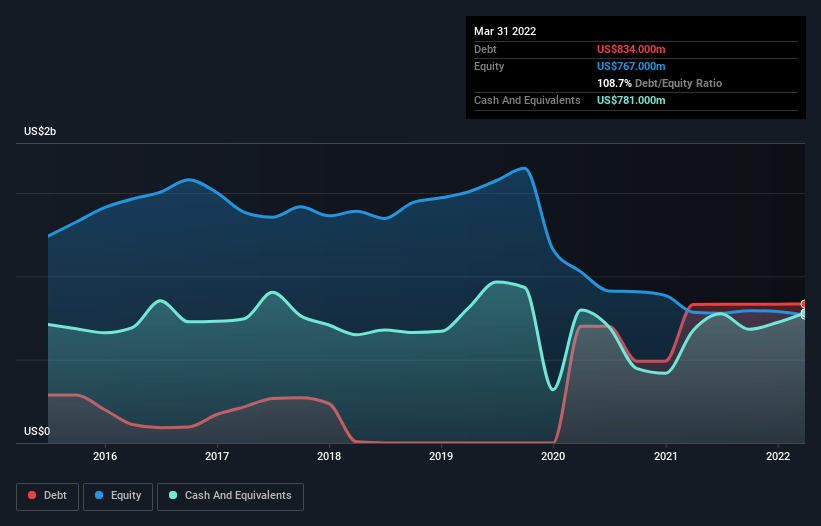- United States
- /
- Interactive Media and Services
- /
- NasdaqGS:TRIP
Tripadvisor (NASDAQ:TRIP) Is Carrying A Fair Bit Of Debt

Legendary fund manager Li Lu (who Charlie Munger backed) once said, 'The biggest investment risk is not the volatility of prices, but whether you will suffer a permanent loss of capital.' So it seems the smart money knows that debt - which is usually involved in bankruptcies - is a very important factor, when you assess how risky a company is. As with many other companies Tripadvisor, Inc. (NASDAQ:TRIP) makes use of debt. But is this debt a concern to shareholders?
When Is Debt Dangerous?
Generally speaking, debt only becomes a real problem when a company can't easily pay it off, either by raising capital or with its own cash flow. Part and parcel of capitalism is the process of 'creative destruction' where failed businesses are mercilessly liquidated by their bankers. However, a more frequent (but still costly) occurrence is where a company must issue shares at bargain-basement prices, permanently diluting shareholders, just to shore up its balance sheet. Having said that, the most common situation is where a company manages its debt reasonably well - and to its own advantage. When we examine debt levels, we first consider both cash and debt levels, together.
See our latest analysis for Tripadvisor
What Is Tripadvisor's Debt?
As you can see below, Tripadvisor had US$834.0m of debt, at March 2022, which is about the same as the year before. You can click the chart for greater detail. However, it also had US$781.0m in cash, and so its net debt is US$53.0m.

How Healthy Is Tripadvisor's Balance Sheet?
The latest balance sheet data shows that Tripadvisor had liabilities of US$467.0m due within a year, and liabilities of US$1.14b falling due after that. Offsetting this, it had US$781.0m in cash and US$229.0m in receivables that were due within 12 months. So it has liabilities totalling US$595.0m more than its cash and near-term receivables, combined.
While this might seem like a lot, it is not so bad since Tripadvisor has a market capitalization of US$2.55b, and so it could probably strengthen its balance sheet by raising capital if it needed to. But it's clear that we should definitely closely examine whether it can manage its debt without dilution. There's no doubt that we learn most about debt from the balance sheet. But it is future earnings, more than anything, that will determine Tripadvisor's ability to maintain a healthy balance sheet going forward. So if you want to see what the professionals think, you might find this free report on analyst profit forecasts to be interesting.
Over 12 months, Tripadvisor reported revenue of US$1.0b, which is a gain of 132%, although it did not report any earnings before interest and tax. So its pretty obvious shareholders are hoping for more growth!
Caveat Emptor
Even though Tripadvisor managed to grow its top line quite deftly, the cold hard truth is that it is losing money on the EBIT line. To be specific the EBIT loss came in at US$67m. When we look at that and recall the liabilities on its balance sheet, relative to cash, it seems unwise to us for the company to have any debt. So we think its balance sheet is a little strained, though not beyond repair. For example, we would not want to see a repeat of last year's loss of US$102m. So in short it's a really risky stock. There's no doubt that we learn most about debt from the balance sheet. However, not all investment risk resides within the balance sheet - far from it. To that end, you should be aware of the 1 warning sign we've spotted with Tripadvisor .
When all is said and done, sometimes its easier to focus on companies that don't even need debt. Readers can access a list of growth stocks with zero net debt 100% free, right now.
Valuation is complex, but we're here to simplify it.
Discover if Tripadvisor might be undervalued or overvalued with our detailed analysis, featuring fair value estimates, potential risks, dividends, insider trades, and its financial condition.
Access Free AnalysisHave feedback on this article? Concerned about the content? Get in touch with us directly. Alternatively, email editorial-team (at) simplywallst.com.
This article by Simply Wall St is general in nature. We provide commentary based on historical data and analyst forecasts only using an unbiased methodology and our articles are not intended to be financial advice. It does not constitute a recommendation to buy or sell any stock, and does not take account of your objectives, or your financial situation. We aim to bring you long-term focused analysis driven by fundamental data. Note that our analysis may not factor in the latest price-sensitive company announcements or qualitative material. Simply Wall St has no position in any stocks mentioned.
About NasdaqGS:TRIP
Tripadvisor
TripAdvisor, Inc., an online travel company, engages in the provision of travel guidance products and services worldwide.
Good value with reasonable growth potential.
Similar Companies
Market Insights
Community Narratives



